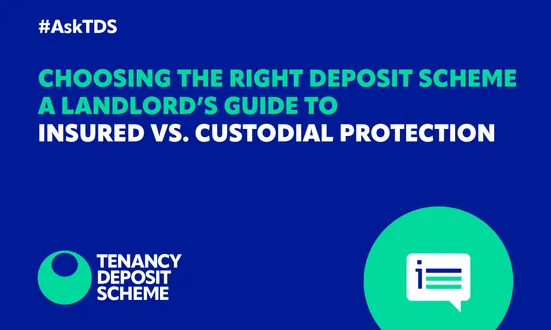In this week’s #AskTDS, we answer a common question from landlords: “My tenants haven’t paid rent since I gave them notice. Can I recover these costs from their deposits?”
It is not uncommon for tenants to ask their landlord to use the deposit to cover their last month’s rent. Landlords should think twice before doing this because if the deposit is used to cover the final month’s rent, it could leave the landlord out of pocket after the tenancy has ended if there are identified dilapidations. And in these cases, the free alternative dispute resolution service offered by TDS would be unable to help.
I’ve always allowed a tenant to skip the last month of rent while I retained their deposit – why should I change this now?
The tenancy deposit is taken under the terms of the tenancy agreement for any loss the landlord may have suffered which were the tenants’ obligations. If a tenancy deposit is equal to one month’s rent it may seem sensible to keep one to forego the other – but this can leave the landlord high and dry for a deposit claim.
For example, let’s say the monthly rent is £750 and so is the deposit. The landlord allows the tenants not to pay the last month’s rent on the condition that the landlord can keep the deposit instead. Once the tenants move out, the landlord visits the property and realises that there is a lot of cleaning, damage and redecoration needed. The estimate for all the work is £600. Since the landlord has already accepted the deposit in lieu of rent, this now leaves them unable to seek the damage and redecoration costs from the deposit. The landlord may instigate court proceedings if the parties fail to agree a further payment for the changes, but this can be expensive and indeed difficult to prove to a Court. Landlords should always seek independent legal guidance before they consider a course of legal action.
In this case the alternative dispute resolution service, which is offered for free from TDS, would not be able to consider the case as the tenancy deposit has already been used in full.
My tenants have lost their jobs and can’t afford the rent. They’ve asked to break the contract early to move back in with family – which I allowed but they disappeared without paying rent.
Once the tenancy has lawfully ended and the tenants have left, landlords can complete a check-out report and then decide if there are any other costs due for the tenancy. If there is no damage, missing items, etc, then with the only cost being the missing rent you can easily cover this cost with the tenancy deposit subject to the tenants’ agreement. You would not need to use the alternative dispute resolution service in this case. However, you should ensure that your tenancy agreement clearly states that you can use the deposit for this purpose.
If you are using the TDS Custodial scheme you will need to submit a statutory declaration in order to retrieve the tenancy, if the tenants are not responding to a request for the deposit to be used.
Should I keep the deposit in lieu of the final month’s rent?
While it may seem like a simple solution to rent issues, automatically using the deposit against rent can cause issues for landlords. Always ensure you have accounted for any additional costs and ensure that your tenancy agreement allows you to recover these costs from the deposit.
For more landlord tips, please view our landlord FAQ page.
About TDS
The Tenancy Deposit Scheme is part of The Dispute Service (TDS), the largest tenancy deposit protection (by value) and resolution service provider in the UK making life easier for tens of thousands of agents, landlords, developers, and millions of tenants and homebuyers.
Our award-winning customer service is highly rated on both Trustpilot and Google, and we’re backed by the NRLA.
We offer free deposit protection in our Custodial scheme, and the lowest rates for landlords in our Insured scheme.

Other news stories


